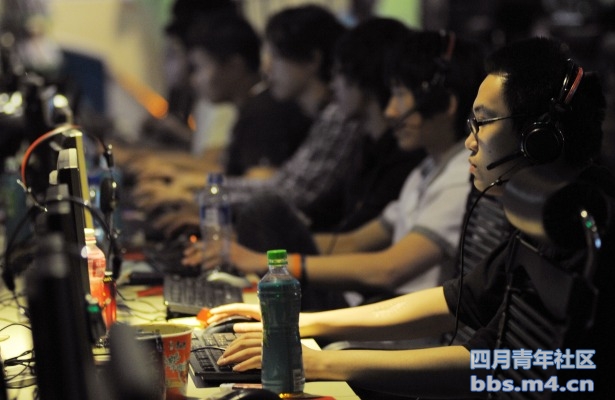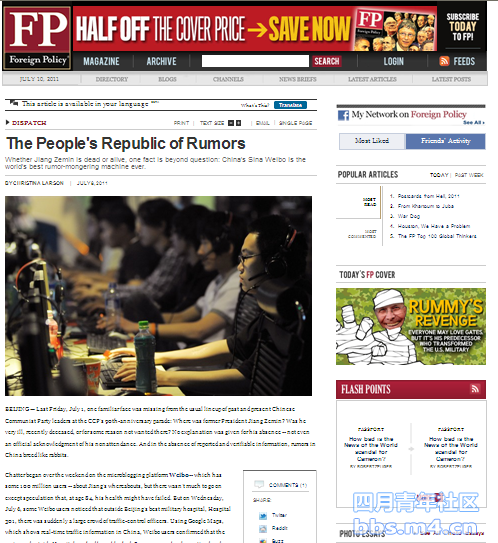|
|
本帖最后由 MacTavish_Tang 于 2011-7-11 08:18 编辑
【原帖标题】:The People's Republic of Rumors
【原帖地址】:http://www.foreignpolicy.com/art ... ic_of_rumors?page=0,0
Whether Jiang Zemin is dead or alive, one fact is beyond question: China's Sina Weibo is the world's best rumor-mongering machine ever.
BY CHRISTINA LARSON | JULY 8, 2011

BEIJING — Last Friday, July 1, one familiar face was missing from the usual lineup of past and present Chinese Communist Party leaders at the CCP's 90th-anniversary parade: Where was former President Jiang Zemin? Was he very ill, recently deceased, or for some reason not wanted there? No explanation was given for his absence -- not even an official acknowledgment of his nonattendance. And in the absence of reported and verifiable information, rumors in China breed like rabbits.
Chatter began over the weekend on the microblogging platform Weibo-- which has some 100 million users -- about Jiang's whereabouts, but there wasn't much to go on except speculation that, at age 84, his health might have failed. But on Wednesday, July 6, some Weibo users noticed that outside Beijing's best military hospital, Hospital 301, there was suddenly a large crowd of traffic-control officers. Using Google Maps, which shows real-time traffic information in China, Weibo users confirmed that the main road outside Hospital301 had been blocked. Some passers-by also noticed and blogged that the small parade of black cars driving into the hospital were not the standard government-issue Audis, but black Mercedes-Benzes fit for VIPs.
No one seemed to have any specific evidence linking the road closure with Jiang, but by the evening it seemed to be taken as almost fact on Weibo that he had passed away and that an official announcement was coming soon. Top Party leaders, the microbloggers claimed, had been summoned back to Beijing! Editors at state-run newspapers had been told to hold the front pages of Thursday's edition for the big news! Andthen … nothing. Thursday morning came and went, the papers published the usual mix of stories, and still no news. (One Hong Kong TV station jumped the gun and ran an obituary, but then retracted it.)
Now, this saga might sound like a mere curiosity, an instance of people shouting in a virtual echo-chamber, but for the fact that China's censors seemed to give credence to the rumors (or at least their fear of them) by ordering certain search terms to be blocked on Weibo: "Jiang" -- a very common word in Chinese, which also means "river" -- and "301" among them. Instead a search would yield the error message: "Due to relevant rules and regulations, the results can't be displayed."
Then on Thursday, China's state-run news agency, Xinhua, finally issued a short statement denying the rumors of Jiang's death, but also failing to offer any alternative explanation for his recent absence: "Recent reports of some overseas media organizations about Jiang Zemin's death from illness are 'pure rumor,' said authoritative sources Thursday." And that was it. Never mind that the rumors were in fact homegrown, or that what any reader really wants to know is not what isn't true (a denial), but what is true. But as of Friday afternoon, the line between fact and fiction remained unclear. Jiang Zemin remains unaccounted for.
It's worth noting that most of the conversation -- save for the Hong Kong TV blooper-- occurred over Chinese social media, in particular Weibo, where Jiang was the top-trending topic on July 6 (before the censors clamped down, of course). I asked a few Chinese friends who aren't close followers of social media for their take on the rumors, and their response was: "What? I hadn't heard."
Weibo is often said to be China's equivalent to Twitter, but in some key ways it's different. First, it allows users to more easily and directly share photos and videos -- more like a Facebook wall than a 140-character text-only entry. This is handy for sharing visual tips like Google traffic maps more virally. (It's also handy for busting seminude officials using the service to sext with mistresses.) Second, and more importantly, is who uses the website. This is admittedly hard to quantify, but among Chinese and expat users of both platforms whose opinions I've solicited, the consensus is that there seems to be a greater percentage of China's business, media, and academic elite actively using Weibo than is true of their counterparts in the United States or Europe using Twitter. The reason? In the West, Twitter is just one of many sources of unfiltered information, whereas in China, access to unfiltered information is harder to come by; microblogs are almost the only game in town. This gives the platform special potency in China.
Weibo spreads fact and fiction alike, at warp speed. It has been used by top businessmen to personally announce their resignation ("Friends, relatives and colleagues, I am giving up everything and eloping with Wang Qin," the tycoon Wang Gongquan blogged in May) and meanwhile used by pseudo-scientists to allege that dam construction impacts the weather. Sometimes it's hard to separate the untrue from the merely unusual.
But let's qualify: Weibo users only really have access to initially unfiltered information. Like all Chinese Internet companies, Sina, the company that owns and operates Weibo, must maintain its own in-house censorship staff. Part of what they do is routine: ensuring that topics that are clearly always sensitive (critiques of current party leadership; the Dalai Lama; etc.) do not become flashpoints. Part of what these censors do is respond to real-time government directives about discussion topics that have arisen suddenly and are deemed too sensitive, and so need to be contained. In such instances, through a combination of automated mechanisms (i.e., rendering certain search terms temporarily inoperable) and manually taking down content,the censors try to put the cat back in the bag, as it were. This is what happened in the case of the Jiang Zemin rumors.
Of course, this means that the censors -- both government directors and in-house corporate censors -- are always a few steps behind the rumors, waiting and watching for discussions to erupt and then trying to quiet them again. It's a precarious effort. A few years ago, several competing microblogging platforms existed in China, but Weibo has since emerged as the clear winner -- in no small part because its parent company, Sina, has figured out how to manage the tricky balance between allowing enough discussion to satisfy users and acting quickly to stifle it when need be. Of course, the company needs the government's approval to keep from being shut down, and for now, it's earned it.
Still, the Jiang Zemin rumors, whatever truth lies behind them, seems to have caught everyone off guard -- spreading nationally, and then internationally, extremely quickly. And speculation still simmers.

|
|